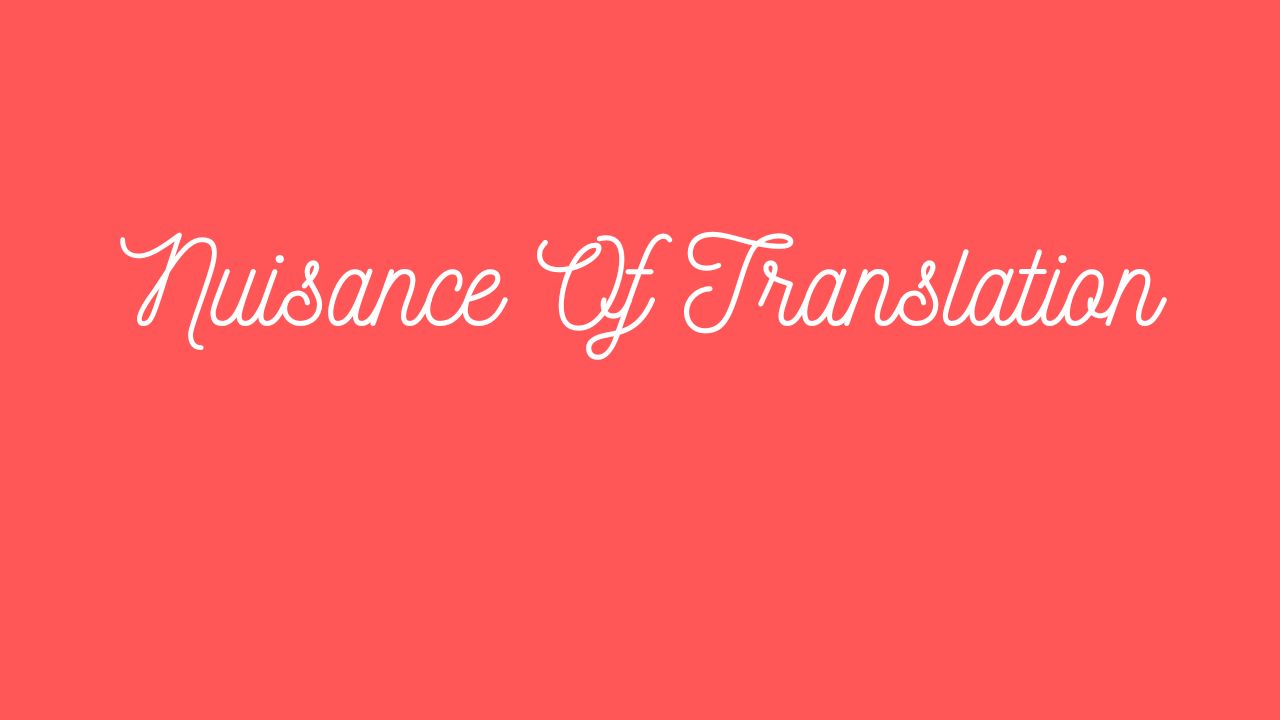
Nuisance Of Translation#
My name is Hari Prasad and I like two food items Rasam and Idly.
If foreigners don’t understand or cannot pronounce what is the meaning of the above sentence then you can do the translation for them. So translation is “Green Food likes two kinds of food items the first item is made of pulses after removing pulse and leaving spicy water and the second item is made of grind rice paste cooked at steam and it is disk-shaped”.
The situation becomes too bad in Japan, China, and Korea where people cannot even pronounce Indian name and they use Chinese or Japanese equivalent.
And we think by doing the above translation we have conveyed that idea and they have understood. But the whole translation is wrong and they will never understand till the time they have experience with Indian culture. Because we don’t know their language and they don’t know our language so we chose a common language like English for communication.
We need to understand there are many non-translatable in every language and you cannot translate them using one-word replacement with another language.
Verbs like Eat, Drink, Walk are common verbs across the world so you can translate them from one language to another. Nouns like Table, Floor, Mango, Apple are common nouns so you can translate them also in another language.
Words that represent a big process or outcome of a complicated process or pure philosophical or abstract cannot be translated. In the initial stage, we try to translate so that other people can understand the basics of our culture, traditions, and philosophy.
Some Non-translatable words which do not have any equivalent in the English language are mentioned below. My suggestion is when you are talking to some Indian person please do not confuse them by doing translation until they don’t have any idea of these terms. Almost all Indian people understand the meaning of these. Unfortunately, many English-speaking people including Gurus and Acharaya do translate these words. My second request is when you are talking to a non-Indian person then try to use the original word and explain to them the meaning and don’t give a one-word substitution. Otherwise, you are diluting the Atma of the word. I know it is painful to explain especially when lots of one-word substitution has been created by many English-speaking Acharya of modern time but still try to understand that by doing so you confuse others, dilute the meaning and demean your own culture.
In the 19th and 20th century when our great Acharyas were doing this translation that time situation was completely different and nobody was listening to us so this translation was necessary. Today when Indians are everywhere and lots of investment is happening or already happened in translating, understanding our ancient scripture this translation is not required. In fact many of these words like Atma, Guru, Karma, Yoga, Pandita has taken place in the English dictionary. In that situation, it is our duty to spend time and try to understand the deeper and correct meaning of Samskrut Non-Translatable words and communicate them as they exist.
- Yagnya
- Karma
- Kaama
- Moksha
- Yoga
- Bhoota
- Prana
- Samadhi
- Dhyana
- Samskara
- Manas
- Chitta
- Darshana
- Vishaya
- Purusha
- Ananda
- Shraddha
- Pragyna
- Klesha
- Kaala
- Pranava
- Upvaas
- Vruta
- Chaitnya
- Rutambhara
- Tatava
- Pranidhyana
- Avidhya
- Maya
- Karma Fala
- Rastra
- Viveka
- Sanyasa
- Rushi
- Jeeva
- Satchitananda
- Devta
- Ishwara
- Bhagwaan
- Brahman
- Kundalini
- Shakti
- Chetna
- Prakurti
- Guna
- Jaati
- Mantra
- Shuyna
- Guru
- Prakash
- Pandita
- Kaivalya
- Nirvaan
- MantraDrusta
- Akshara
- Sindoor
- Udageeta
- Upanishad
- Punyam
- Paapam
- Satya
- Linga
- Bhava
- Rasa
- Adhyatma
- Prasadam
- Tarpana
Shri Rajiv Malhotra’s Book Being Different helped me to understand this nuisance of our culture and I have written this from his inspiration. The above list can be expended but the above terms came on top of my mind so wrote them to help others to understand the nuisance of translation.
Hari Om Tata Sat
Yours Truly Hari


Comments: